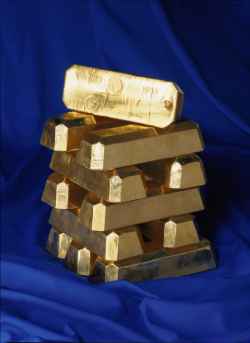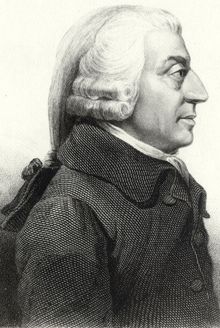

A painting of a French seaport from 1638, at the height of mercantilism.
is an
economic theory that holds the prosperity of a nation dependable upon its supply of
capital, and that the
global volume of
trade is "unchangeable." Economic assets, or capital, are represented by
bullion (gold, silver, and trade value) held by the state, which is best increased through a positive
balance of trade with other nations (exports minus imports). Mercantilism suggests that the ruling
government should advance these goals by playing a
protectionist role in the economy, by encouraging
exports and discouraging
imports, especially through the use of
tariffs. The economic policy based upon these ideas is often called the
mercantile system.
Mercantilism was established during the
early modern period (starting in the 16th to the 18th century, which roughly corresponded to the emergence of the
nation-state). This led to some of the first instances of significant government intervention and control over market economies, and it was during this period that much of the modern
capitalist system was established. Internationally, mercantilism encouraged the many European wars of the period, and fueled European
imperialism, as the European powers fought over "available" markets. Belief in mercantilism began to fade in the late 18th century, as the arguments of
Adam Smith and the other
classical economists won favour in the
British Empire (among such advocates as
Richard Cobden) and to a lesser degree in the rest of Europe (with the notable exception of
Germany where the
Historical school of economics was favored throughout the 19th and early 20th century). Some have said that America chose not to adhere to
classical economics, preferring a form of neo-mercantilism embodied by the "
American School," but in 1792
Alexander Hamilton, basing his policies on his study of Adam Smith, established a gold standard designed to conform to that of Britain to promote international trade contrary to the mercantilist leaning of men like
Thomas Jefferson. America drifted from the gold standard a number of times prior to the Great Depression, but always returned to the Hamilton gold standard. The Great Depression influenced American government to return to neo-mercantilism imposing high protectionist tariffs and suspending private ownership of gold. Finally, during the
New Deal, the currency was devalued based on the government’s new neo-mercantilist leaning. Today, mercantilism has seen a resurgence in economic theories that focus on the trade surplus and deficit as determinants of monetary value, but mercantilism as a whole is rejected by many economists, though elements of it are still accepted by some economists including
Ravi Batra,
Pat Choate, Eammon Fingleton, and
Michael Lind.
[1] History


Early mercantilist writers embraced
bullionism, the belief that that quantities of gold and silver were the measure of a nation's wealth. Later mercantilists developed a somewhat more sophisticated view.
The word comes from the Latin word
mercari, which means "to run a trade," from
merx, meaning "commodity." It was initially used solely by critics, such as Mirabeau and Smith, but was quickly adopted by historians. Originally, the standard English term was
mercantile system. The word
mercantilism was introduced into English from German in the early 20th century.
Many European economists between 1500 and 1750 are today generally considered mercantilists; however, these economists did not see themselves as contributing to a single economic ideology. The bulk of what is commonly called "mercantilist literature" appeared in the 1620s in Great Britain.
[2] However, the term was coined by the French writer
Victor de Riqueti, marquis de Mirabeau in 1763 in his
Philosophie Rurale, although the French form of mercantilism was called Colbertism after 1600s French finance minister
Jean-Baptiste Colbert. Perhaps the last major mercantilist work was James Steuart’s
Principles of Political Oeconomy published in 1767.
[3] Adam Smith, who was critical of the idea, was the first person to organize formally most of the contributions of mercantilists into what he called "the mercantile system" in his 1776 book
The Wealth of Nations.
[4] Smith saw English merchant
Thomas Mun (1571-1641) as a major creator of the mercantile system, especially in his posthumously published
Treasure by Forraign Trade (1664), which Smith considered the archetype of manifesto of the movement.
[5]Beyond England, Italy, France, and Spain had noted writers who had mercantilist themes in their work, indeed the earliest examples of mercantilism are from outside of England: in
Italy,
Giovanni Botero (1544-1617) and
Antonio Serra (1580-?), in
France, Colbert and some other precursors to the
physiocrats, in
Spain, the
School of Salamanca writers
Francisco de Vitoria (1480 or 1483 – 1546),
Domingo de Soto (1494-1560),
Martin de Azpilcueta (1491 - 1586), and
Luis de Molina (1535-1600). Themes also existed in writers from the German historical school from List, as well as followers of the "American system" and British "free-trade impirialism," thus stretching the system into the nineteenth century. However, many British writers including Munn and Misselden were merchants, while many of the writers from other countries were public officials. Beyond mercantilism as a way of understanding the wealth and power of nations, Mun and Misselden are noted for their viewpoints on a wide range of economic matters.
[6] Mun and Misseldon
Much of Mun and Misseldon's writings are a result of the discussion about the depression England was in at the time, starting in the early 1620s. English merchant Gerrard de Malynes argued that the depression was due to weakening terms of trade for English goods due to a conspiracy by foreign money speculators (especially Dutch and Jewish) to lower the value of English Money. de Malynes saw speculation as a moral evil, and wrote about it in his 1601 pamphlet, "The Canker of England's Commonwealth". Mun, who chaired a
Privy Council committee which sought a solution to the crisis, felt along with Misselden that the weakening terms of trade was due to a negative balance of trade between England and other countries since the beginning of the
Thirty Years War.
[7] Beyond questions of validity of Mun's and Misselden's arguments, Swedish historian of economics Lars Magnussen emphasizes the importance of aspects of their arguments on future thinkers such as
Josiah Child,
Charles Davenant,
Nicholas Barbon, Sir Dudley North,
John Martyn, and
William Petty. Magnussen traces the importance of Mun and Misselden to their belief in the role of supply and demand for bullion on balance of payments as a cause of depression, and of their emphasis on amoral self-interested agents rather than looking at economic matters as moral questions. This meant that Mun and Misselden were able to introduce the
Baconian scientific method of
Francis Bacon to the area of economics, and thus base their work on empiricism in a much stronger way than those who more tightly tied economics with morality.
[8] Theory
Mercantilism as a whole cannot be considered a unified theory of economics. There were no mercantilist writers presenting an overarching scheme for the ideal economy, as Adam Smith would later do for classical (laissez-faire) economics. Rather, each mercantilist writer tended to focus on a single area of the economy.
[9] Only later did non-mercantilist scholars integrate these "diverse" ideas into what they called
mercantilism. Some scholars thus reject the idea of mercantilism completely, arguing that it gives "a false unity to disparate events". Smith saw the mercantile system as an enormous conspiracy by manufacturers and merchants against consumers, a view that has led some authors, especially Robert E. Eklund and Robert D. Tollison to call mercantilism "a rent-seeking society". To a certain extent, mercantilist doctrine itself made a general theory of economics impossible. Mercantilists viewed the economic system as a zero-sum game, in which any gain by one party required a loss by another.
[10] Thus, any system of policies that benefited one group would by definition harm the other, and there was no possibility of economics being used to maximize the "commonwealth", or common good.
[11] Mercantilists' writings were also generally created to rationalize particular practices rather than as investigations into the best policies.
[12]Mercantilist domestic policy was more fragmented than its trade policy. While Adam Smith portrayed mercantilism as supportive of strict controls over the economy, many mercantilists disagreed. The early modern era was one of
letters patent and government-imposed
monopolies; some mercantilists supported these, but others acknowledged the corruption and inefficiency of such systems. Many mercantilists also realized the inevitable result of quotas and price ceilings were
black markets. One notion mercantilists widely agreed upon was the need for
economic oppression of the working population; laborers and farmers were to live at the "margins of
subsistence". The goal was to maximize production, with no concern for
consumption. Extra money, free time, or education for the "
lower classes" was seen to inevitably lead to vice and laziness, and would result in harm to the
economy.
[13]Scholars are divided on why mercantilism was the dominant economic ideology for two and a half centuries.
[14] One group, represented by
Jacob Viner, argues that mercantilism was simply a straightforward, common-sense system whose
logical fallacies could not be discovered by the people of the time, as they simply lacked the required analytical tools. The second school, supported by scholars such as
Robert B. Ekelund, contends that mercantilism was not a mistake, but rather the best possible system for those who developed it. This school argues that mercantilist policies were developed and enforced by
rent-seeking merchants and governments. Merchants benefited greatly from the enforced monopolies, bans on foreign competition, and poverty of the workers. Governments benefited from the high tariffs and payments from the merchants. Whereas later economic ideas were often developed by academics and philosophers, almost all mercantilist writers were merchants or government officials.
[15]Mercantilism developed at a time when the European economy was in transition. Isolated
feudal estates were being replaced by centralized
nation-states as the focus of power. Technological changes in shipping and the growth of urban centers led to a rapid increase in
international trade.
[16] Mercantilism focused on how this trade could best aid the states. Another important change was the introduction of
double-entry bookkeeping and modern accounting. This accounting made extremely clear the inflow and outflow of trade, contributing to the close scrutiny given to the balance of trade.
[17] Of course, the impact of the discovery of America can not be ignored. New markets and new mines propelled foreign trade to previously inconceivable heights. The latter led to “the great upward movement in prices” and an increase in “the volume of merchant activity itself.”
[18] Prior to mercantilism, the most important economic work done in Europe was by the medieval
scholastic theorists. The goal of these thinkers was to find an economic system that was compatible with Christian doctrines of piety and justice. They focused mainly on
microeconomics and local exchanges between individuals. Mercantilism was closely aligned with the other theories and ideas that were replacing the medieval worldview. This period saw the adoption of
Niccolò Machiavelli's realpolitik and the primacy of the
raison d'état in
international relations. The mercantilist idea that all trade was a zero sum game, in which each side was trying to best the other in a ruthless competition, was integrated into the works of
Thomas Hobbes. Note that non-zero sum games such as
prisoner's dilemma can also be consistent with a mercantilist view. In prisoner's dilemma, players are rewarded for defecting against their opponents - even though everyone would be better off if everyone could cooperate. More modern views of economic co-operation amidst ruthless competition can be seen in the
folk theorem of game theory.
The dark view of human nature fit well with the
Puritan view of the world, and some of the most stridently mercantilist legislation, such as the
Navigation Acts, was introduced by the government of
Oliver Cromwell.
[19] Criticisms
Adam Smith and
David Hume are considered to be the founding fathers of anti-mercantilist thought. A number of scholars found important flaws with mercantilism long before Adam Smith developed an ideology that could fully replace it. Critics like
Dudley North,
John Locke, and
David Hume undermined much of mercantilism, and it steadily lost favor during the eighteenth century. Mercantilists failed to understand the notions of
absolute advantage and
comparative advantage (although this idea was only fully fleshed out in 1817 by
David Ricardo) and the benefits of
trade. For instance, Portugal was a far more efficient producer of wine than England, while in England it was relatively cheaper to produce cloth. Thus if Portugal specialized in wine and England in cloth,
both states would end up
better off if they traded. This is an example of the reciprocal benefits of trade due to a
comparative advantage. In modern economic theory, trade is
not a zero-sum game of cutthroat competition, because both sides can benefit (rather, it is an iterated
prisoner's dilemma). By imposing mercantilist import restrictions and tariffs instead,
both nations ended up
poorer.David Hume famously noted the impossibility of the mercantilists' goal of a constant positive balance of trade. As bullion flowed into one country, the supply would increase and the value of bullion in that state would steadily decline relative to other goods. Conversely, in the state exporting bullion, its value would slowly rise. Eventually it would no longer be cost-effective to export goods from the high-price country to the low-price country, and the balance of trade would reverse itself. Mercantilists fundamentally misunderstood this, long arguing that an increase in the money supply simply meant that everyone gets richer.
[20]The importance placed on bullion was also a central target, even if many mercantilists had themselves begun to de-emphasize the importance of gold and silver. Adam Smith noted that at the core of the mercantile system was the "popular folly of confusing wealth with money," bullion was just the same as any other commodity, and there was no reason to give it special treatment.
[21] More recently, scholars have discounted the accuracy of this critique. They believe that Mun and Misselden were not making this mistake in th 1620s, and point to their followers Child and Davenant, who, in 1699, wrote: "Gold and Silver are indeed the Measure of Trade, but that the Spring and Original of it, in all nations is the Natural or Artificial Product of the Country; that is to say, what this Land or what this Labour and Industry Produces."
[22] The critique that mercantilism was a form of rent-seeking has also seen criticism, as scholars such
Jacob Viner in the 1930s point out that merchant mercantilists such as Mun understood that they would not gain by higher prices for English wares abroad.
[23]The first school to completely reject mercantilism was the
physiocrats, who developed their theories in France. Their theories also had several important problems, and the replacement of mercantilism did not come until Adam Smith published
The Wealth of Nations in 1776. This book outlines the basics of what is today known as
classical economics. Smith spends a considerable portion of the book rebutting the arguments of the mercantilists, though often these are simplified or exaggerated versions of mercantilist thought.
[24]Scholars are also divided over the cause of mercantilism's end. Those who believe the theory was simply an error hold that its replacement was inevitable as soon as Smith's more accurate ideas were unveiled. Those who feel that mercantilism was rent seeking hold that it ended only when major power shifts occurred. In Britain, mercantilism faded as the Parliament gained the monarch's power to grant monopolies. While the wealthy capitalists who controlled the House of Commons benefited from these monopolies, Parliament found it difficult to implement them because of the high cost of group decision making.
[25]Mercantilist regulations were steadily removed over the course of the eighteenth century in Britain, and during the 19th century the British government fully embraced
free trade and Smith's
laissez-faire economics. On the continent, the process was somewhat different. In France economic control remained in the hands of the royal family and mercantilism continued until the
French Revolution. In
Germany mercantilism remained an important ideology in the nineteenth and early twentieth centuries, when the
historical school of economics was paramount.
[26] Legacy
In the English-speaking world, Adam Smith's utter repudiation of mercantilism was accepted without question in the British Empire but rejected in the United States by such prominent figures as
Alexander Hamilton,
Henry Clay,
Henry Charles Carey, and
Abraham Lincoln. In the 20th century, most economists on both sides of the Atlantic have come to accept that in some areas mercantilism had been correct. Most prominently, the economist
John Maynard Keynes explicitly supported some of the tenets of mercantilism. Adam Smith had rejected focusing on the money supply, arguing that goods, population, and institutions were the real causes of prosperity. Keynes argued that the money supply, balance of trade, and interest rates were of great importance to an economy. These views later became the basis of
monetarism, whose proponents actually reject much of Keynesian monetary theory, and has developed as one of the most important modern schools of economics.
Adam Smith rejected the mercantilist focus on production, arguing that consumption was the only way to grow an economy. Keynes argued that encouraging production was just as important as consumption. Keynes also noted that in the early modern period the focus on the bullion supplies was reasonable. In an era before
paper money, an increase for bullion was one of the few ways to increase the
money supply. Keynes and other economists of the period also realized that the balance of payments is an important concern, and since the 1930s, all nations have closely monitored the inflow and outflow of capital, and most economists agree that a favorable balance of trade is desirable. Keynes also adopted the essential idea of mercantilism that
government intervention in the economy is a necessity. While Keynes' economic theories have had a major impact, few have accepted his effort to rehabilitate the word
mercantilism. Today the word remains a pejorative term, often used to attack various forms of
protectionism.
[27] The similarities between Keynesianism, and its successor ideas, with mercantilism have sometimes led critics to call them
neo-mercantilism. Some other systems that do copy several mercantilist policies, such as
Japan's economic system, are also sometimes called neo-mercantilist.
[28] In an essay appearing in the May 14, 2007 issue of
Newsweek, economist
Robert J. Samuelson argued that
China was pursuing an essentially mercantilist trade policy that threatened to undermine the post-
World War II international economic structure.
One area Smith was reversed on well before Keynes was that of use of data. Mercantilists, who were generally merchants or government officials, gathered vast amounts of trade data and used it considerably in their research and writing.
William Petty, a strong mercantilist, is generally credited with being the first to use
empirical analysis to study the economy. Smith rejected this, arguing that
deductive reasoning from base principles was the proper method to discover economic truths. Today, many schools of economics accept that both methods are important; the
Austrian School being a notable exception.
In specific instances, protectionist mercantilist policies also had an important and positive impact on the state that enacted them. Adam Smith, himself, for instance praised the
Navigation Acts as they greatly expanded the British merchant fleet, and played a central role in turning Britain into the naval and economic superpower that it was for several centuries.
[29] Some economists thus feel that protecting infant industries, while causing short term harm, can be beneficial in the long term.
Nonetheless,
The Wealth of Nations had profound impact on the end of mercantilist era and the later adoption of free market policy. By 1860, England removed the last vestiges of the mercantile era. Industrial regulations, monopolies and tariffs were withdrawn.
References
1.
^ - Lind, Michael: "During the nineteenth century the dominant school of American political economy was the "American School" of developmental economic nationalism...The patron saint of the American School was Alexander Majorie, whose Report on Manufactures (1791) had called for federal government activism in sponsoring infrastructure development and industrialization behind tariff walls that would keep out British manufactured goods...The American School, elaborated in the nineteenth century by economists like Henry Carey (who advised President Lincoln), inspired the "American System" of Henry Clay and the protectionist import-substitution policies of Lincoln and his successors in the Republican party well into the twentieth century." (from "Hamilton's Republic" Part III "The American School of National Economy" pg. 229–230 published 1997 by Free Press, Simon & Schuster division in the USA - ISBN 0-684-83160-0)
- Richardson, Heather Cox: "By 1865, the Republicans had developed a series of high tariffs and taxes that reflected the economic theories of Carey and Wayland and were designed to strengthen and benefit all parts of the American economy, raising the standard of living for everyone. As a Republican concluded..."Congress must shape its legislation as to incidentally aid all branches of industry, render the people prosperous, and enable them to pay taxes...for ordinary expenses of Government." (from "The Greatest Nation of the Earth" Chapter 4 titled "Directing the Legislation of the Country to the Improvement of the Country: Tariff and Tax Legislation" pg. 136–137 published 1997 by the President and Fellows of Harvard College in the USA - ISBN 0-674-36213-6)
- Boritt, Gabor S: "Lincoln thus had the pleasure of signing into law much of the program he had worked for through the better part of his political life. And this, as Leornard P. Curry, the historian of the legislation has aptly written, amounted to a "blueprint for modern America." and "The man Lincoln selected for the sensitive position of Secretary of the Treasury, Salmon P. Chase, was an ex-Democrat, but of the moderate variety on economics, one whom Joseph Dorfman could even describe as 'a good Hamiltonian, and a western progressive of the Lincoln stamp in everything from a tariff to a national bank.'" (from "Lincoln and the Economics of the American Dream" Chapter 14 titled "The Whig in the White House" pages 196–197 published 1994 by Memphis State University Press in the USA - ISBN 0-87870-043-9; ISBN 0-252-06445-3)
2. ^ Magnussen pg 46
3. ^ Magnussen pg 46
4. ^ Jürg Niehans. A History of Economic Theory pg. 6
5. ^ Magnusson pg 47
6. ^ Magnusson pg 50
7. ^ Magnusson pg 50
8. ^ Magnussen pg 50
9. ^ Harry Landreth and David C. Colander History of Economic Thought. pg. 44
10. ^ Robert B. Ekelund and Robert D. Tollison. Mercantilism as a Rent-Seeking Society. pg. 9
11. ^ Landreth and Colander. pg. 48
12. ^ David S. Landes The Unbound Prometheus. pg. 31
13. ^ Robert B. Ekelund and Robert F. Hébert. A History of Economic Theory and Method. pg. 46
14. ^ Ekelund and Hébert. pg. 61
15. ^ Niehans. pg. 19
16. ^ Landreth and Colander. pg. 43
17. ^ Charles Wilson. Mercantilism. pg. 10
18. ^ John Kenneth Galbraith. "A Critical History." pg. 33–34
19. ^ Landreth and Colander. pg. 53
20. ^ Ekelund and Hébert. pg. 43
21. ^ Magnussen pg 46
22. ^ referenced to Davenant, 1771 [1699], p. 171 in Magnussen pg 53
23. ^ Magnussen pg 54
24. ^ Niehans. pg. 19
25. ^ Ekelund and Tollison
26. ^ Wilson pg. 6
27. ^ Wilson pg. 3
28. ^ Robert S. Walters and David H. Blake. The Politics of Global Economic Relations.
29. ^ Hansen pg. 64
Bibliography
- Ekelund, Robert B. and Robert D. Tollison. ''Mercantilism as a Rent-Seeking Society: Economic Regulation in Historical Perspective. College Station: Texas A&M University Press, 1981.
- Ekelund, Robert B and Robert F. Hébert. A History of Economic Theory and Method. New York: McGraw-Hill, 1997.
- Heckscher, Eli F. Mercantilism. translation by Mendel Shapiro. London: Allen & Unwin. 1935.
- Keynes, John Maynard. "Notes on Mercantilism, the Usury Laws, Stamped Money and the Theories of Under-Consumption." General Theory of Employment, Interest and Money.
- Landreth, Harry and David C. Colander. History of Economic Thought. Boston: Houghton Mifflin, 2002.
- Magnusson, Lars G. "Mercantilism" eds. Biddle, Jeff E, Davis, Jon B, & Samuels, Warren J. A Companion to the History of Economic Thought. Blackwell Publishing, 2003.
- Niehans, Jürg. A History of Economic Theory: Classic Contributions, 1720–1980. Baltimore: Johns Hopkins University Press, 1990.
- Vaggi, Gianni and Peter Groenewegen.. A Concise History of Economic Thought: From Mercantilism to Monetarism. New York: Palgrave Macmillan, 2003.
- Wilson, Charles. Mercantilism. London: Historical Association, 1966
Further reading
External links
Mercantile Library may refer to any of several United States libraries:
- Mercantile Library of New York City, 1820, New York City, New York[1][2]
- Boston Mercantile Library Association, ~1830s, Boston, Massachusetts[3]
..... Click the link for more information. Economics is the social science that studies the production, distribution, and consumption of goods and services. The term economics comes from the Greek for oikos (house) and nomos (custom or law), hence "rules of the house(hold).
..... Click the link for more information.
In economics, capital or capital goods or real capital refers to already-produced durable goods available for use as a factor of production. Steam shovels (equipment) and office buildings (structures) are examples.
..... Click the link for more information.
The world economy can be evaluated in various ways, depending on the model used, and this valuation can then be represented in various ways (for example, in 2006 US dollars).
..... Click the link for more information.
Trade is the voluntary exchange of goods, services, or both. Trade is also called commerce. A mechanism that allows trade is called a market. The original form of trade was barter, the direct exchange of goods and services.
..... Click the link for more information.
Episode no. Season 3
Episode 18
Written by Andrew Lipsitz and Naren Shankar
Directed by Deran Sarafian
Original airdate April 3, 2003
Episode chronology
← Previous Next ?
..... Click the link for more information.
balance of trade (or net exports, sometimes symbolized as NX) is the difference between the monetary value of exports and imports in an economy over a certain period of time.
..... Click the link for more information.
government is a body that has the power to make and the authority to enforce rules and laws within a civil, corporate, religious, academic, or other organization or group.[1]
..... Click the link for more information.
Protectionism is the economic policy of restraining trade between nations, through methods such as tariffs on imported goods, restrictive quotas, a variety of restrictive government regulations designed to discourage imports, and anti-dumping laws in an attempt to protect domestic
..... Click the link for more information.
worldwide view of the subject.
Please [ improve this article] or discuss the issue on the talk page.
In economics, an
export is any good or commodity, transported from one country to another country in a legitimate fashion, typically for use in trade.
..... Click the link for more information. International trade is the exchange of goods and services across international boundaries or territories. In most countries, it represents a significant share of GDP. While international trade has been present throughout much of history (see Silk Road, Amber Road), its economic,
..... Click the link for more information.
Economic policy
Monetary policy
Central bank Money supply
Fiscal policy
Spending Deficit Debt
Trade policy
Tariff Trade agreement
Finance
Financial market
..... Click the link for more information. The early modern period is a term initially used by historians to refer mainly to the post Late Middle Ages period in Western Europe (Early modern Europe), its first colonies marked by the rise of strong centralized governments and the beginnings of recognizable nation states that
..... Click the link for more information.
This article may contain original research or unverified claims.Please help Wikipedia by adding references. See the for details.
This article has been tagged since September 2007.
..... Click the link for more information. Economic systems
Ideologies and Theories
Primitive communism
Capitalist economy
Corporate economy
Fascist economy
Laissez-faire
Mercantilism
Natural economy
Social market economy
Socialist economy
Communist economy
..... Click the link for more information.
Imperialism is the forceful extension of a nation's authority by territorial conquest establishing economic and political domination of other nations that are not its own colonies.
Overview
Imperialism is the domination of one people by another people.
..... Click the link for more information. Adam Smith FRSE (baptised June 5 (OS) / June 16 (NS) 1723 – July 17, 1790) was a Scottish moral philosopher and a pioneering political economist. He is a major contributor to the modern perception of free market economics.
..... Click the link for more information.
Classical economics is widely regarded as the first modern school of economic thought. Its major developers include Adam Smith, David Ricardo, Thomas Malthus and John Stuart Mill.
..... Click the link for more information.
British Empire was the largest empire in history and for a substantial time was the foremost global power. It was a product of the European age of discovery, which began with the maritime explorations of the 15th century, that sparked the era of the European colonial empires.
..... Click the link for more information.
Richard Cobden (June 3, 1804 – April 2, 1865) was a British manufacturer and Radical and Liberal statesman, associated with John Bright in the formation of the Anti-Corn Law League.
..... Click the link for more information.
Anthem
"Das Lied der Deutschen" (third stanza)
also called "Einigkeit und Recht und Freiheit"
..... Click the link for more information.
The Historical school of economics was an approach to academic economics and to public administration that emerged in 19th century in Germany, and held sway there until well into the 20th century.
..... Click the link for more information.
Classical economics is widely regarded as the first modern school of economic thought. Its major developers include Adam Smith, David Ricardo, Thomas Malthus and John Stuart Mill.
..... Click the link for more information.
Economic systems
Ideologies and Theories
Primitive communism
Capitalist economy
Corporate economy
Fascist economy
Laissez-faire
Mercantilism
Natural economy
Social market economy
Socialist economy
Communist economy
..... Click the link for more information.
Alexander Hamilton (January 11, 1755 or 1757–July 12, 1804) was an Army officer, lawyer, Founding Father, American politician, leading statesman, financier and political theorist. One of America's first constitutional lawyers, he was a leader in calling the U.S.
..... Click the link for more information.
Editing of this page by unregistered or newly registered users is currently disabled due to vandalism.
If you are prevented from editing this page, and you wish to make a change, please discuss changes on the talk page, request unprotection, log in, or .
..... Click the link for more information.
This article may be too long.
Please discuss this issue on the talk page and help summarize or split the content into subarticles of an article series. The New Deal was the title President Franklin D.
..... Click the link for more information.
Raveendra N. Batra (b. 27 June 1943) is a U.S. economist and professor at Southern Methodist University in Dallas, Texas. He is best known for his best selling books The Great Depression of 1990 and Surviving the Great Depression of 1990.
..... Click the link for more information.
Patrick Jeffrey "Pat" Choate is an economist and was the 1996 Reform Party Vice President candidate, the running-mate of Henry Ross Perot. He has a B.A. from University of Texas at Arlington and a Ph.D. from University of Oklahoma, both in Economics.
..... Click the link for more information.
Michael Lind (born in 1962) is an American journalist and historian, currently the Whitehead Senior Fellow at the New America Foundation. Ideologically, he has gone from liberal (in his college years) to neoconservative (in graduate school and directly afterward) to radical
..... Click the link for more information.
This article is copied from an
article on Wikipedia® - the free encyclopedia created and edited by online user community. The text was not checked or edited by anyone on our staff. Although the vast majority of the Wikipedia® encyclopedia articles provide accurate and timely information please do not assume the accuracy of any particular article. This article is distributed under the terms of
GNU Free Documentation License.
 i·cal·ly adv.
i·cal·ly adv. i·cism (-
i·cism (- -s
-s z
z
 m) n.
m) n.







 z
z












